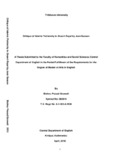Please use this identifier to cite or link to this item:
https://elibrary.tucl.edu.np/handle/123456789/3226| Title: | Critique of Islamic Patriarchy in Desert Royal by Jean Sasson |
| Authors: | Gnawali, Bishnu Prasad |
| Keywords: | Feminism;Islamic Literature;Islamic Novel |
| Issue Date: | Apr-2016 |
| Publisher: | Central Department of English Kirtipur, Kathmandu |
| Abstract: | This research casts light on how the rigid Islamic practices like polygamy, early marriage, and hegemony of Islamic doctrine subjugate and subordinate female characters in Desert Royal. Sara‘s husband treats her as a being that is much lower than a eunuch. The probe into the degraded plight of the female characters, the perspective of Islamic feminism is wholly apt and appropriate. Female characters in the novel are subjected to various harrowing experiences: Daughter is forced to marry a man double their ages; husbands treat their wives as though they are less important than eunuchs. Polygamy Islamic orthodoxy, high level of gender biases and institutionalized discrimination of women are some of the crucial factors that lead to the extreme subjugations of women. The pervasive influence of Islamic doctrine in each and every compartment of life has weakened and harassed female characters unbelievably. Sultana mobilizes those tortured and tormented female characters to resist injustice and atrocity leveled against them by their respective husbands. Their subordinated, excluded and alienated lives prove that they are subaltern people in an Arabic land that is under the grip of Islamic patriarchy. Total separation of daughters from most of decision making sections brings to a halt the chance of growth in women‘s movement. The connection between Islamic doctrine and patriarchal society of Saudi Arabia has foreclosed all the avenue of opportunities of freedom and empowerment of women. |
| URI: | http://elibrary.tucl.edu.np/handle/123456789/3226 |
| Appears in Collections: | English |
Items in DSpace are protected by copyright, with all rights reserved, unless otherwise indicated.

